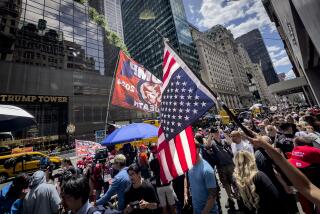Hong Kong Is All Aflutter Over Flag Desecration Case
- Share via
HONG KONG — History was made two years ago when the Chinese flag, with its yellow stars and revolutionary-red background, supplanted Britain’s imperial Union Jack over this bustling city.
Now that symbol of mainland authority lies at the center of a controversy whose main question is one that Americans have been grappling with for years: Should it be lawful for someone to desecrate the national flag?
The answer is expected soon from Hong Kong’s highest court in a decision being closely watched by activists seeking clues to the future Hong Kong faces under its Communist overlords.
For human rights groups, at stake are nothing less than the civil liberties Hong Kong residents enjoyed when Britain ruled the roost. China promised to preserve those rights under its “one country, two systems” formula for governing this former colonial outpost during the first 50 years of Chinese rule.
“It’s clearly an important case,” said attorney Philip Dykes, the vice chairman of Human Rights Monitor, a nonprofit watchdog group here. “It’s a freedom-of-speech issue.”
But for others, the issue is not as clear-cut. Woven into the flag, they say, is the potent stuff of national dignity.
“Hong Kong people very much treasure freedom of expression. At the same time, most Hong Kong people have also accepted the idea that we should show respect for our national flag,” said Tsang Yok-sing, a legislator who belongs to the pro-Beijing Democratic Alliance for the Betterment of Hong Kong.
The debate was propelled into the spotlight last year by two young men who took part in a New Year’s Day protest calling on Beijing to implement democratic reforms. During the demonstration, the pair unfurled a Chinese flag with the yellow stars blacked out and the character for “shame” splashed across it. They also hoisted the new Hong Kong flag, with its central symbol, a local flower, crossed out.
The two protesters were arrested, convicted of flag desecration and ordered to show good behavior for a year, avoiding the maximum sentence of three years in prison.
But last March, an appeals court threw out the conviction, ruling that mainland and local laws against defiling flags were an unjustified restriction of free expression and a breach of Hong Kong’s new constitution, known as the Basic Law. The case now rests with the Court of Final Appeal.
It is the second major test of the legal mettle of the “one country, two systems” formula since Hong Kong’s reversion to Chinese sovereignty in July 1997.
Earlier this year, Hong Kong Chief Executive Tung Chee-hwa rocked the territory by gaining Beijing’s help in overturning a high court ruling that liberalized residency regulations for immigrants from the mainland. Civil rights advocates denounced the move as undermining Hong Kong’s autonomy, and they fear that Beijing might be summoned again to overrule the high court if the justices uphold the right to deface flags.
Last week, a U.N. human rights committee in Geneva warned that such actions could jeopardize Hong Kong’s judicial independence.
But those in favor of outlawing flag desecration contend that a ban is necessary not only to protect national dignity, but also to preserve public order.
“If anybody can treat the national flag as a normal piece of cloth and do whatever he likes in public with it, I believe that can involve a risk of provoking strong feelings, perhaps leading to undesirable social consequences,” said Tsang, the legislator.
“There are so many ways to speak out very clearly your criticisms of the government,” he added. “Any individual who is not satisfied with what the government does or says can express his opinions in a large number of lawful ways.”
Opponents of the ban cite other countries where flag-tampering remains a lawful form of free speech. Their No. 1 example: the U.S., where the Supreme Court struck down state and federal anti-flag-burning statutes in 1989 and 1990.
“In Hong Kong before the hand-over, it was lawful to desecrate the Union Jack, the Chinese flag or any other flag, and flag desecration had been performed in demonstrations and performances for over three decades without problems,” the Human Rights Monitor told the U.N. committee in Geneva. “There is no evidence that these acts led to breaches of the peace.”
More to Read
Sign up for Essential California
The most important California stories and recommendations in your inbox every morning.
You may occasionally receive promotional content from the Los Angeles Times.














